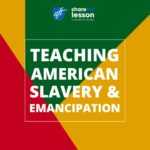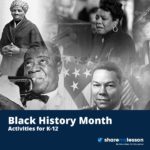Learn about Black history in the United States before and after the Civil War; the Civil Rights Movement; the history of Africa; African American art; and African American trailblazers.
American Slavery Lesson Plans: Teaching Hard History

If you are lesson planning for the school year, or getting ready to celebrate Juneteenth — the June 19 holiday recognizing the abolition of slavery — this Share My Lesson collection has what you need to teach preK-12 students the history of American slavery. This preK-12 lesson and activity curated collection is in response to a Southern Poverty Law Center report, “Teaching Hard History: American Slavery,” that shows that schools are failing to teach American Slavery. This collection of resources features some of our partner and users’ best material to ensure schools and teachers have the support they need to teach about the history of American slavery.
Black History Month Lesson Plans on Nonviolence
The power of nonviolent actions and attitudes as a means to resist oppression and spur reforms is a recurring feature of democratic and democratizing societies. The School Violence Prevention Demonstration Program presents educators with lesson plans that explore the use of nonviolence in history, paying particular attention to the civil rights movement and African American history. Six lessons address: the 1963 Children’s March; the concept of nonviolence using primary sources and stories of participants in the civil rights movement; the power of nonviolence; the story of Rosa Parks; citizenship schools; how music can be used to achieve social and political change.
African American History Month Resources
African American History Month evolved from the birthdays of Abraham Lincoln and Frederick Douglass in the second week of February. Historian and author Dr. Carter G. Woodson framed the concept that became the first Negro History Week in February 1926. It developed into a monthlong commemoration of the struggles and triumphs of the African American community. On this page, learn the stories of Autherine Lucy Foster, the first African American student to attempt to integrate the University of Alabama; Frank M. Johnson, Jr., the federal judge who ruled in the Rosa Parks case; and Linda Brown, the 9-year-old who became the face of children caught in the crossfire of the fight for social change. The Pathways to the Bench video series features profiles of African American federal judges who offer perspectives on their experiences during the Civil Rights era.
Competing Voices of the Civil Rights Movement
When most people think of the Civil Rights Movement in America, they think of Martin Luther King, Jr. delivering his “I Have a Dream” speech on the steps of the Lincoln Memorial in 1963 and receiving the Nobel Peace Prize the following year. But “the Movement” achieved its greatest results — the 1964 Civil Rights Act and the 1965 Voting Rights Act — due to the competing strategies and agendas of diverse individuals. Even black Americans, the primary beneficiaries of this landmark legislation, did not agree on the tactics that should be used to secure the equal protection of their rights. This unit presents the views of several important black leaders who shaped the debate over how to achieve freedom and equality in a nation that had long denied a portion of the American citizenry the full protection of their rights.
Black History Month Lesson Plans & Resources

This February, start your Black History Month lesson planning with Share My Lesson’s expanded collection. The Share My Lesson team has curated a collection of free lessons, worksheets, and activities for educators to use to teach preK-12 students about key events and individuals whose accomplishments continue to influence us today.
Declaration Revisited: Black Americans Podcast
This is the first of three revisits to the Declaration of Independence; three communities to which the tenets of life, liberty, and the pursuit of happiness did not apply. Byron Williams, author of The Radical Declaration, walks us through how enslaved Americans and Black Americans pushed against the document from the very beginning of our nation’s founding.
This short episode includes a one-page Graphic Organizer for students to take notes on while listening, as well as discussion questions on the back side.
Freedom Summer 1964
Freedom Summer is a digital learning tool (available on the web or as an app) for teachers and students that explores key events surrounding this time in America’s history and the impact of the civil rights movement on civil rights legislation. Players predict the outcomes of civil and congressional actions and discover how the events are intertwined. Students have the opportunity to view informative intro and outro videos and analyze 20 primary sources depicting images of civil rights events. Analysis of a variety of primary sources and supplemental information leads students to identify varying perspectives and potential outcomes. Freedom Summer is formatted for all types of computers and mobile devices, including Chromebooks, and can be found on the website or in any app store for download.
Moments in History: Remembering Thurgood Marshall
Few people know the legal mind of justices or judges as well as the law clerks who have worked with them. Justice Thurgood Marshall’s former law clerks offer unique insights into the character, values, and thought processes of the first African American to serve on the Supreme Court of the United States. In this 8.5-minute video called “Moments in History: Remembering Thurgood Marshall,” prominent lawyers reminisce about the examples of compassion and courage they saw in the life and work of this legal legend.
U.S. Supreme Court Decisions and Justices Who Made Them
“Who cares what old people in black robes say?” As an educator you care. The challenge is how do you get your students excited about Article III of the Constitution. Constituting America has organized 90 Supreme Court cases of influential and history-changing decisions in its Constitution Archives. Need a judicial decision on what you are studying? Find it here. Need a Supreme Court ruling on a current event? Find it here. You get the picture. The material you seek is here. Your challenge, should you accept it, is make it come alive to your students.